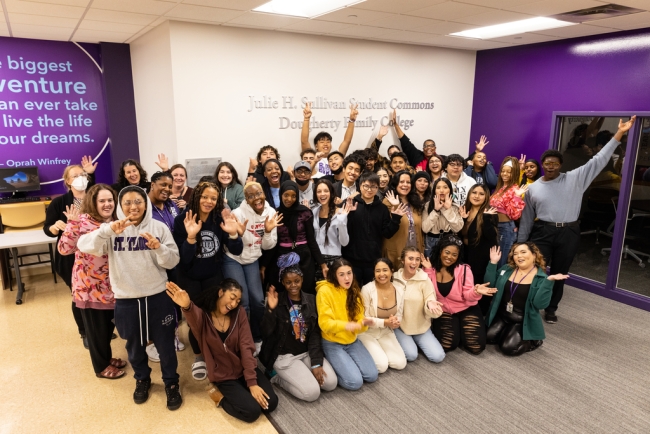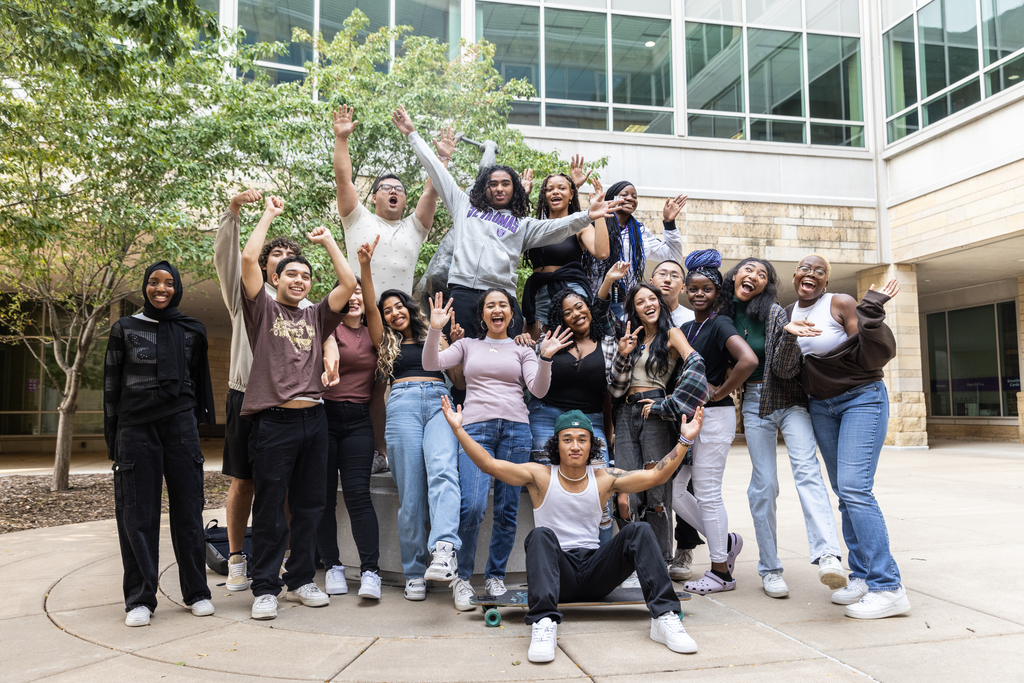You have /5 articles left.
Sign up for a free account or log in.

Students at Dougherty Family College are provided wraparound supports as they progress toward earning their associate degrees.
Dougherty Family College
For low-income or underrepresented minority students, earning their associate or bachelor’s degree is key to economic mobility in the long term.
At the University of St. Thomas in Minnesota, administrators believe they have a responsibility to address the educational attainment gap, says Buffy Smith, dean of Dougherty Family College. “If the educational attainment gap is a structural problem, to solve or eliminate that educational attainment gap will require a structural solution.”
Dougherty Family College (DFC) is a two-year college within St. Thomas that provides wraparound resources and support for students looking to earn an associate degree.
“It’s all intentionally designed to address the barriers … that scholars from underresourced communities face in terms of attaining their degree,” Smith says.
The college provides scholarships, school supplies, peer support, mentorship and a paid internship to its scholars, preparing them for success in their college career and their life beyond DFC.
Building blocks of success: Dougherty Family College launched in 2017 with $18 million in private donations. The college can accommodate around 300 scholars annually across both first- and second-year levels.
Students apply directly to the college through the university’s application process. To be eligible, students must display a high level of financial need and hold at least a 2.5 GPA from high school. Around 95 percent of Dougherty students are Black, Indigenous or people of color; 80 percent are Pell eligible; and 80 percent are first-generation students.
Dougherty’s model pulls from Arrupe College at Loyola University Chicago, with a focus on financial accessibility, culturally sustaining pedagogy, relationships between peers and mentors, and relevant internship experience for scholars.
Financial access: Every DFC student receives a scholarship on top of Pell Grants or state grants, as eligible. Scholars with an expected family contribution of $0 according to their FAFSA pay around $1,000 a year to attend St. Thomas, Smith says. The average DFC student cost is $2,970.
Beyond scholarships, DFC provides resources like free laptops and textbooks for students who can’t afford them. The Scholars’ Resource Center on campus provides a DFC learners a study space, tutoring help and access to a literacy or math specialist.
The college provides up to 10 free breakfast or lunch meals per week on campus, and students receive a Metro Transit pass to get them to and from campus. Because DFC is a commuter college, students are not provided housing, but staff can help students find off-campus residences.
Course design: The two-year course sequence hits the core requirements of Minnesota institutions, so students can finish their studies at St. Thomas or transfer to another institution without losing ground on their degree progression.
Special to St. Thomas is a 12-credit faith, social responsibility and justice course requirement that scholars complete at DFC. The three courses address theology, philosophy and justice and peace studies, according to the college’s website.
Additionally, all students complete a first-year experience seminar, which equips them with academic success skills like time management and studying techniques.
“We are intentional about creating lesson plans that reflect and incorporate the cultural and lived experiences of our scholars,” Smith says. “We select textbooks and readings by BIPOC and diverse authors. We encourage our scholars to see themselves as creative problem solvers. We want our scholars to feel like co-teachers and collaborators in the classroom.”
After they complete at DFC, a persistence counselor works with students regardless of the institution they enroll in to provide additional support and ensure they’re connected to the resources they’ll need to finish their bachelor’s degree.
Community support: Students start at DFC in a two-week summer enrichment program in August. During that time, students are introduced to their cohort, a group of 25 to 30 students with whom they’ll take all classes for the next two years as they move through DFC.
The cohorts are mostly randomized, with a little shuffling to ensure gender and racial diversity represented in each group and that “our scholars in the cohort are not all coming from the same high school,” Smith says.
Each cohort has a faculty or staff mentor from the college who meets with students one-on-one and with the group once a month. DFC has 12 dedicated faculty members, three contract professors and 15 staff members. Staff responsibilities include financial aid, academic success, retention and life skills coaching.

Dougherty Family College
Building experience: The spring semester of students’ first year includes a professional development curriculum within the first-year experience course, which makes students eligible for a paid internship.
Bridging the educational attainment gap is a key factor in breaking cycles of generational poverty, Smith says.
“We know our scholars don’t have an option not to work,” Smith says. “Given the needs of their family and they contribute to their family, to ask them not to work for a full two years and just focus on their education is not realistic, nor would it be responsible for us as an institution to make that request.”
Instead, DFC partners with nonprofits and corporate organizations to provide meaningful, paid internship opportunities for its students during the summer between their first and second year. Many students stay on with their internship host during their second year.
“Our curriculum is set up to accommodate one day of the week, which is Tuesday, to allow scholars not to take any classes but to focus their time and energy on their paid internship program,” Smith says.
Corporate partners sponsoring their internships pay students around $16 to $18 per hour, and nonprofits use federal work-study funding to compensate students.
While many students come in with work experience, the internship’s goal is to provide career exploration and demonstrate how meaningful work can unlock individuals’ passions.
“We’ve been blessed that some of our graduates who have earned their bachelor’s degree are now working as full-time employees in organizations like Target and U.S. Bank,” Smith says. “It has been good for our scholars, their families, of course, but also for companies who are looking to make investment and in terms of diversifying their workforce.”
Program outcomes: Since 2017, 266 scholars have graduated with their associate degrees, and the college hopes to add 40 to 45 more alumni by the end of this summer.
DFC’s two-year graduation rate is 56 percent. Across Minnesota in 2021, 24 percent of students graduate from public institutions within three years, 22 percent graduate from private for-profits within three years, and 33 percent graduate from private nonprofit institutions, according to the Office of Higher Education at Minnesota Measures.
Of the graduates, 77 percent are enrolled in a bachelor’s degree program or earned their bachelor’s degree. At the end of this academic year, DFC will have sufficient data to create a six-year graduation rate among its scholars for earning a bachelor’s degree.
The program also has accomplished its mission to create financial access for its scholars, as 92 percent of DFC alumni graduated without student loan debt.
Editor's Note: This article was updated to correct the two-year graduation rate.
If your student success program has a unique feature or twist, we’d like to know about it. Click here to submit.




